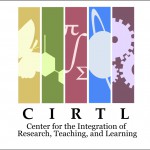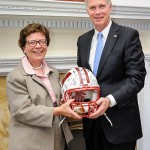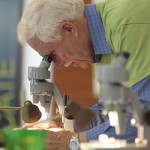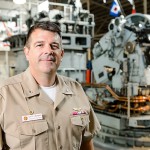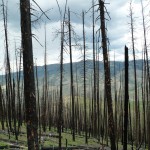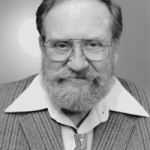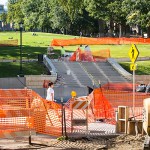Immigrant Justice Clinic gets creative to meet the needs of children facing deportation
Since last October, the U.S. Border Patrol has apprehended more than 60,000 Central American children who crossed the nation’s southern border on their own.
Employee Assistance Office to host open house
UW–Madison’s new Employee Assistance Director, Sherry Boeger, hopes that many in the campus community will take time out of their busy day to enjoy some light refreshments and meet her staff at an open house at the Lowell Center on November 7 from 3-5 p.m.
Bipartisan Issues Group strives to find solutions
While Congressional gridlock in Washington continues to attract public ire and media attention, a UW–Madison student organization is working to promote bipartisanship across campus. The Bipartisan Issues Group, or BIG, has entered its third year on campus. According to the group’s mission statement, its goal is to “prove that realistic solutions to America’s . . . toughest problems do indeed exist.”
New reports offer a statistical portrait of Wisconsin’s Latino population
Wisconsin's Latino population is 74 percent larger and significantly more homegrown today than it was at the beginning of the century, according to a report by University of Wisconsin–Madison demographers.
Physicist turns smartphones into pocket cosmic ray detectors
Soon, the growing capability of your smart phone could be harnessed to detect cosmic rays in much the same way as high-end, multimillion-dollar observatories. With a simple app addition, Android phones, and likely other smartphone brands in the not-too-distant future, can be turned into detectors to capture the light particles created when cosmic rays crash into Earth’s atmosphere.
Unique MOOC with in-person sessions offered for future and current college STEM faculty
A new MOOC (Massive Open Online Course) offering an in-person twist — local weekly facilitated meetings — debuts next week to help future and current college STEM (science, technology, engineering and math) faculty become better teachers. It is designed to be of special interest to grad students planning to teach professionally.
Recent sightings: Handoff to Johnson
UW-Madison Chancellor Rebecca Blank holds an autographed Wisconsin football helmet with U.S. Sen. Ron Johnson during a meeting in Blank's Bascom Hall office on Sept. 30, 2014.
UW-Madison joins consortium to improve digital teaching and learning
The University of Wisconsin–Madison announced today that it is joining Unizin, a consortium of like-minded universities that are developing a common set of improved digital tools for teaching and learning.
Phi Beta Kappa Society recognizes Wisconsin Science Festival
The Phi Beta Kappa Society’s National Arts & Sciences Initiative will recognize the Wisconsin Science Festival with a Key of Excellence Award at a…
UW employee benefits enrollment starts Oct. 6
The Annual Benefits Enrollment period for University of Wisconsin–Madison employees, when an employee may enroll or make changes to existing benefit plans, is Oct. 6-31. Any changes become effective Jan 1, 2015.
After 26 years in flight, Murdoch lands with UW Naval ROTC
Capt. Christopher Murdoch, who spent 26 years on active duty in some of the world’s major trouble spots as an aviator in the U.S. Navy, has taken command of the UW–Madison Naval ROTC unit. During a July ceremony, Murdoch took over for Capt. Russ Haas, who retired after three years as Wisconsin ROTC’s commanding officer.
Winning climate change solutions range from meat processing to mindfulness
The Climate Quest competition to spur innovative climate change solutions is down to a field of five. At the Climate Quest Concept Pitch on Sept. 19, 18 teams presented their ideas to a panel of investors and entrepreneurs, who rated the ideas on many factors including creativity, scalability and potential impact. The panel selected five teams to advance to the next round of the competition.
Internal communications improvements underway
Robust internal communications are essential to a well-functioning workplace. An Administrative Process Redesign project recently completed a study of the issue on campus and is suggesting a set of improvements on behalf of UW employees.
Mountain pine beetles get a bad rap for wildfires, study says
Mountain pine beetles get a bad rap, and understandably so. The grain-of-rice-sized insects are responsible for killing pine trees over tens of millions of acres in the Western U.S. and Canada over the last decade. But contrary to popular belief, these pests may not be to blame for more severe wildfires like those that have recently swept through the region. Instead, according to a new study by UW–Madison zoology professor Monica Turner, weather and topography play a greater role in the ecological severity of fires than these bark-boring beetles.
How do lawyers matter? Study explores the question for low-income litigants
For every 6,415 people in the United States who qualify for legal aid (income at or below 125 percent of the poverty line), there is one legal aid attorney, leaving about three-quarters of low-income civil litigants in the United States unrepresented and creating an increasingly prevalent situation that some call a "justice gap."
In memoriam: Ray D. Owen discovered immune tolerance, paved the way for organ transplantation
Ray D. Owen, who died on Sept. 21 in Pasadena, California, at the age of 98, discovered the phenomenon of immune tolerance, fueling a revolution in immunology and laying the foundation for the successful transplantation of human organs. Owen left Madison in 1947 to join the faculty at Caltech, where he remained for the rest of his long, distinguished career. His later work included studies on human antibodies, blood-group antigens, and the evolution of immune systems.
UW-Madison School of Music presents plans for new recital hall
The University of Wisconsin–Madison's School of Music is moving ahead with plans to construct the first phase of a new performance center at the corner of Lake Street and University Avenue.
Environmental historian William Cronon awarded Wilderness Society’s highest honor
Environmental historian and University of Wisconsin–Madison professor William Cronon has been presented with The Wilderness Society’s Robert Marshall Award — the organization’s highest civilian honor — for his contributions to the protection of America’s wild places. The award, named for wilderness visionary Robert Marshall, is given to a private citizen who has made outstanding, long-term contributions to conservation and fostering an American land ethic.
Bascom Hill staircase to open in October; mall to follow soon
After four months of construction, the State Street Mall and related Bascom Hill staircase projects are finally nearing the finish line.




